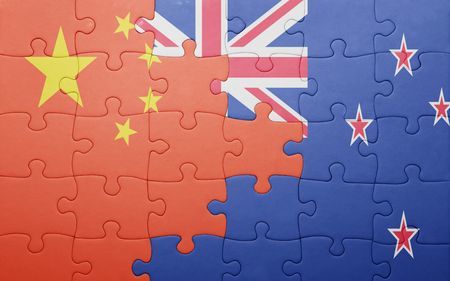China says it’s ready to co-operate with Australia in the Pacific

China says it is willing to co-operate with Australia in the Pacific, signalling a rhetorical and diplomatic shift following the election of the Labor government.
China’s Foreign Minister Wang Yi on Monday failed to get consensus from 10 Pacific nations to sign up for Beijing’s “Common Development Vision,” a regional security deal in exchange for trade and economic co-operation that sparked fears of China’s economic and military ambitions in Washington and Canberra. But at least half-a-dozen countries including Samoa, Kiribati and Niue have signed up for enhanced co-operation in Beijing’s trillion-dollar Belt and Road infrastructure investment program.
Fiji’s Prime Minister Frank Bainimarama, who hosted Wang for the Pacific foreign ministers meeting in Suva, said the region had to work together to face existential threats before signing up for any major multilateral deals.
“We put consensus first,” said Bainimarama. “Geopolitical point scoring means less than little to anyone whose community is slipping beneath the rising seas, whose job has been lost to a pandemic.”
“China is a major developing country, and we do this with a great sense of responsibility.”
Wang presented a message from President Xi Jinping stating China was willing to work with Pacific Island nations to build a “community with a shared future” – highlighting Beijing’s growing diplomatic investment in the region after signing a landmark security and trade deal with Solomon Islands in April.
“China is willing to enhance communication with all countries that care about Pacific Island Countries, especially Australia and New Zealand, and give full play to respective strengths to carry out more trilateral co-operation on the basis of respecting Pacific Island Countries’ wishes,” he said.
Wang’s comments followed a diplomatic blitz by Foreign Minister Penny Wong last week. Wong said it was up to individual nations to make sovereign decisions about their future but warned them that a region-wide deal with Beijing could sacrifice their independence, lead to unsustainable debt levels and endanger the Pacific’s security. The countries visited by Wang sit on a key strategic route between the United States, Australia and Asia and less than 2000 kilometres off the coast of Queensland that could block supply lines in the event of a conflict.
Wang failed to get consensus on the Pacific-mega deal but halfway through his 10-day tour has signed dozens of bilateral agreements including police training in Samoa, COVID-19 economic recovery plans with Fiji, radio and television co-operation with Niue and climate change and marine protection programs with Kiribati.
Beijing’s top diplomat has positioned China in meetings with his Pacific counterparts as the leader of a growing group of developing countries that feel left out of the US-led international order that he argues is fuelled by Western geopolitical aims.
“Developing countries need to strengthen solidarity,” Wang said on Sunday.
“As the largest developing country, we have always stood by developing countries and stood firm for fairness and justice for small and medium-sized countries.”
Prime Minister Anthony Albanese has yet to publicly respond to a message from Chinese Premier Li Keqiang congratulating him on his election. Beijing’s tone since the Labor victory on May 20 has been trending softer but $20 billion in trade sanctions on Australian exports remain in place and Albanese has maintained that Australia would not begin negotiations until trade restrictions were lifted.
Read also
Wheat in Southern Brazil Impacted by Dry Weather and Frosts
Oilseed Industry. Leaders and Strategies in the Times of a Great Change
Black Sea & Danube Region: Oilseed and Vegoil Markets Within Ongoing Transfor...
Serbia. The drought will cause extremely high losses for farmers this year
2023/24 Safrinha Corn in Brazil 91% Harvested
Write to us
Our manager will contact you soon



